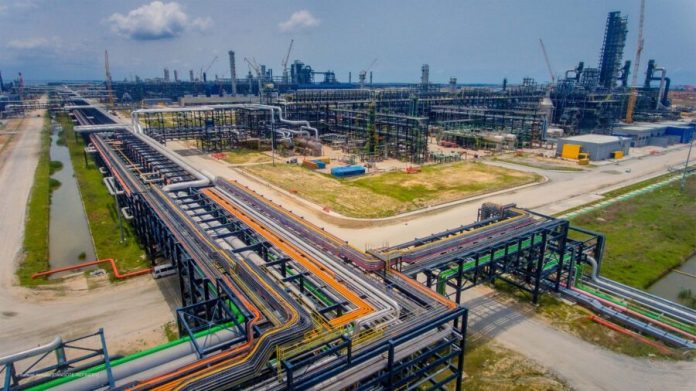Senate Reopens Probe of N11.35tr TAM Cost, N1.6tr Loss On Refineries

The wasteful management of Nigeria’s refineries, especially the N11.35 trillion Turn Around Maintenance (TAM) cost and another N1.6 trillion loss incurred on the moribund assets, which is now being rehabilitated for $2.2 billion is generating fresh concerns on the floor of the Senate.
The Senate, yesterday, in Abuja, insisted that it would get to the root of the wasteful spending along with another $592.9 million, €4.877 million and £3.456 million wasted on the assets in the last 13 years.
Already, the lawmakers have constituted an ad-hoc committee to probe all the contracts awarded for the rehabilitation of all state-owned refineries, even as Nigerians await the promise of President Bola Tinubu that the assets, especially Port Harcourt refinery, would come up stream in December this year amid the mess caused by total dependence on importation of Premium Motor Spirit (PMS).
This comes as the upper chamber moves to interrogate the Ministry of Petroleum Resources, the Nigerian Upstream Petroleum Regulatory Commission (NUPRC), Nigerian National Petroleum Corporation Limited (NNPCL) and Bureau of Public Enterprises (BPE) on the best approach to commercialise the state-owned refineries.
Nigeria has three refineries located in Kaduna, Port Harcourt in Rivers State and Warri in Delta State. These assets’ installed capacity of 445,000bpd plummeted over the years until the facility got obsolete and currently processes zero crude, while recording massive losses.
READ ALSO: Tinubu: Nigerians Will Soon Start Reaping Benefits Of My Administration’s Tough Decisions
Buried in corruption with a series of probes at the National Assembly indicting public officials for misappropriating funds meant for TAM, documents on the financial details of previous maintenance exercises, especially since the military regime, have been scanty.
The Guardian had reported that despite being shut down, NNPC may have left over N136 billion as operational deficits across its three refineries. On average, NNPC was spending, plus or minus, N68 billion yearly in paying salaries and other expenses at the moribund refineries. In about two years, the losses had amounted to an average of N136 billion.
The Deputy Senate President, Barau Jibrin (APC, Kano), who presided over the plenary, named Senator Isah Jibrin Echocho as chairman of the committee. Other members are chairmen of the committees on Petroleum Resources (Downstream, Upstream and Gas), Finance, Appropriation, and Public Accounts. They are to submit the report within four weeks.
The committees are also to interrogate the Federal Ministry of Petroleum Resources, NUPRC, NNPCL, and BPE on the best approach to commercialising and/or ensuring profitability of the refineries.
DESPITE criticisms against the purchase of very expensive 2023 model of the Toyota Landcruiser and Prado SUVs being procured for the use of 469 members of the National Assembly, the Senate yesterday justified the purchase of the Toyota Landcruiser for 107 of its members at the contract price of about N160 million each.
This is in addition to the bullet-proof vehicles being purchased for the Senate President, Godswill Akpabio and his deputy, Barau Jibrin. The move had drawn the ire of Nigerians, who have been criticising the lawmakers for being insensitive to the plight of Nigerians amid high cost of living.
But the Red Chamber defended the purchase of the SUVs, saying lawmakers needed the vehicles for their operations. Briefing reporters at the National Assembly, the chairman, Committee on Senate services, Sunday Karimi (APC,Kogi), said the criticism was uncalled for as members of the other arms of government used similar vehicles. He urged critics to beam their searchlight on ministers and members of states’ Houses of Assembly.
He said: “A minister has more than three Landcruisers, Prado and other vehicles and you are not asking them questions, why us?
“The issue of buying vehicles for National Assembly members, you know it is a reoccurring issue. It occurs at the beginning of every assembly, it will always come up.
“If you go to state Houses of Assembly today, check out, most of them before they were even inaugurated, the governor would have bought vehicles for them, even local government chairmen. I drive the vehicle my local government chairman uses. So, why the noise on the National Assembly?
“These vehicles that you see, check the Nigerian roads today, if I go home once to my senatorial district, I come back spending a lot on my vehicles because our roads are bad.”
Karimi said the Senate settled for Toyota Landcruiser against a local product after a comparative analysis of cost, technical issues and durability on Nigeria roads.
ON the refineries’ probe, the Red Chamber further called on NNPCL, NUPRC and Liquifued Natural Gas (LNG) to explain the nation’s preparation for Green Energy Sources in line with the Paris Agreement on Climate Change.
The resolutions came following the adoption of a motion on the urgent need to investigate the various TAM projects of the refineries yesterday to uncover waste and forestall further squander of scarce public resources. The motion was sponsored by Karimi Sunday (APC-Kogi).
Sunday, in his lead debate, said the refineries in Nigeria have been a serious drainpipe of public finance, depriving citizens of the joy of being an oil-producing nation. He said between 2010 to date, Nigeria was estimated to have spent N11.35 trillion on renovation of refineries, yet they still remain unproductive.
He also revealed other costs in other currencies, which include $592.9 million, €4.877 million and £3.456 million, had been spent. Sunday added that the Federal Government had spent over N6 trillion between 2010 and 2020 on fuel subsidy due to Nigeria’s low refining capacity and has spent almost twice the amount on rehabilitating the refineries within the same period.
He said despite the moribund state of the refineries, their operating costs between 2010 and 2020 was estimated at N4.8 trillion. “The refineries are estimated to make a cumulative loss of N1.64 trillion within four years.
Concerned that government has carried out rehabilitation projects in Port Harcourt Refinery Company (PHRC) over a period of seven years from 2013 to 2019, he said phase 1 of the project was expected to be completed in 28 months after the contract, while phase 2 is within 24 months and phase 3 within 44 months of execution since 2021.
He, however, lamented that the Port Harcourt refinery as at October 24, 2023, remained a money pit. He said by projections and representations from NNPCL, the renovation work ought to be completed and operations of the refinery to commence by June 2023.
Sunday also informed that the Federal Government, in a bid to revitalise the Warri Refinery, injected huge public funds between 2014 and 2019. He added that on June 24, 2022, the Federal Executive Council (FEC) awarded Maintenance Services for Quick Fix Repairs of Warri Refinery to Daewoo Engineering and Construction Limited at $497 million.
“Yet at the moment, the Warri Refinery is inactive. This is different from the 2017 contract award to Saipem Contracting Nigeria Limited for Tech Plant Survey of the Warri and Kaduna Refineries at 2,025,000.32 Euros.”
He also said it was disturbing that the Kaduna Refinery and Petro-Chemical Company (KRPC) has over the past 10 years gulped N2.266 billion in the name of rehabilitation, yet the refinery remains unproductive.
“NNPCL approved a renovation deal with Daewoo Engineering and Construction Limited to renovate Kaduna refinery in February 2023. And it is intended to restore the refinery to production of 110,000 barrels of petrol per day, at least 60 per cent capacity by early 2024.”
He submitted that if a thorough investigation of the past and current rehabilitation project were not undertaken by the Senate, the circle of awarding unproductive turnaround maintenance contracts may not abate. This, he said, would result in retaining the status quo, adding that rehabilitation contracts have become conduit pipes for siphoning public funds.
He said Nigerian citizens have continued to groan over the high cost of petroleum products due to the moribund situation of the refineries.
Contributing, Senator Isa Jibril (APC-Kogi), who seconded the motion, said the motion brought to the fore the worrisome situation in the nation’s oil and gas sector. He said it was worrisome that N4.8 trillion was spent on operating cost, when the refineries were not functional.
Senator Adams Oshiomhole (APC-Edo) said the Senate must ensure its proper oversight functions to ensure Nigerians enjoy value for their taxes.
We need to unravel why the refineries that were working before suddenly became moribund. The amount so far spent on the refineries can build brand new ones. Senators must take the issues with all the seriousness it deserves.
Adamu Aliero alleged that the moribund nature of the refineries was a deliberate sabotage by some persons who wanted to continue petroleum products importation into the country.
Other senators who contributed, while decrying the inactiveness of the refineries, included Adeola Solomon (APC-Ogun), Aliyu Wadada (SDP-Nasarawa), Danjuma Goje (APC-Gombe), and Darlington Nwokocha (LP-Abia) among others.
The Senate also urged the committee to ascertain the progress on ongoing works in all the refineries to forestall waste and corruption. It also urged the committee to interrogate the Federal Ministry of Petroleum Resources, NUPRC, NNPCL, and BPE on the best approach to commercialising or ensuring profitability of the refineries.
Deputy President of Senate, Jibrin Barau, who presided over the plenary, said those found to have taken funds meant for functioning of the refineries should be brought to book




